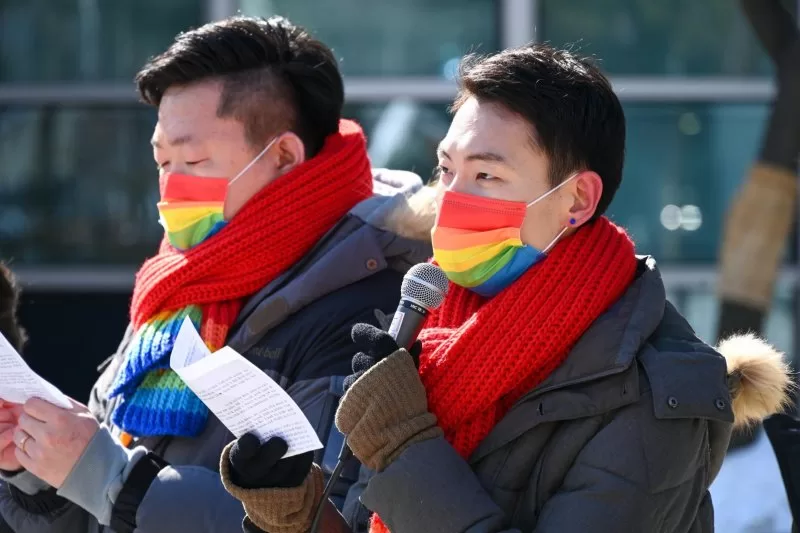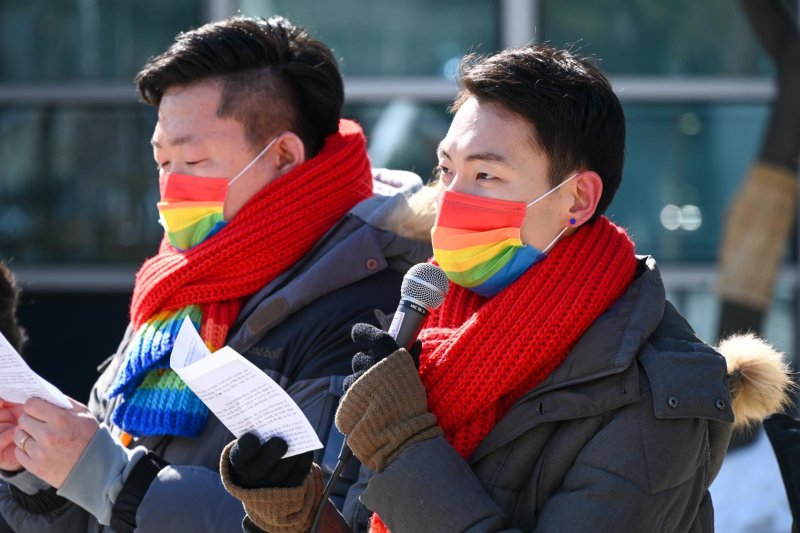A South Korean Supreme Court ruling Thursday upheld a landmark ruling that found same-sex couples were entitled to the same spousal health insurance benefits as heterosexual couples. So Seong-wook and Kim Yong-min initially filed the lawsuit that led to the decision in 2021. File Photo by Thomas Maresca/UPI
SEOUL, July 18 (UPI) — South Korea’s top court on Thursday affirmed that same-sex couples are entitled to the same spousal health insurance benefits as heterosexual couples, a ruling that advocates are hailing as a historic victory for LGBTQ rights in the country.
The decision upheld a landmark 2023 ruling by the Seoul High Court, which found the country’s National Health Insurance Service was required to offer spousal benefits to a gay couple that had filed a lawsuit.
The Supreme Court ruled that denying the couple benefits “discriminates against people in a de facto marriage relationship without any rational reason and is illegal as it violates the principle of equality under the Constitution.”
“Even though there is no explicit provision in the National Health Insurance Act to exclude same-sex partners from being dependents, excluding them just because they are of the same sex is discrimination based on sexual orientation,” Thursday’s decision said. “It is a violation of human dignity and value, the right to pursue happiness, freedom of privacy and the right to equality before the law.”
Same-sex marriages and civil unions are not recognized in South Korea, but the verdict means that common-law spouses will now be able to register as dependents on their partners’ health insurance.
The decision traces back to 2020, when So Seong-wook successfully added his partner Kim Yong-min as a dependent under his state health insurance coverage. Several months later, however, the NHIS canceled Kim’s benefits, calling the registration a “mistake.”
So filed a lawsuit against the NHIS, which was initially dismissed by an administrative court but then upheld on appeal in February 2023.
The NHIS, South Korea’s public insurance scheme that covers almost the entire population, appealed that outcome to the Supreme Court, leading to Thursday’s final decision.
The verdict was greeted as a giant step forward for the lesbian, gay, bisexual, transgender and queer community in South Korea, which remains a deeply conservative country on a number of social issues.
“Today’s ruling is a historic victory for equality and human rights in South Korea,” Amnesty International East Asia researcher Boram Jang said in a statement. “The Court has taken a significant step towards dismantling systemic discrimination and ensuring inclusivity for all.”
Advocates continue to call for further progress, however, including the passage of an anti-discrimination law that has languished in parliament for years and the decriminalization of consensual sex between men in the military.
“While this decision is a major milestone, the case itself is a sobering reminder of the lengthy judicial processes that same-sex couples must endure to secure basic rights that should be universally guaranteed,” Jang said. “It is disheartening that in 2024, same-sex couples still face such significant barriers to equality.”
Same-sex marriage is now legal in 37 countries and territories around the world. South Korean activists have looked to progress being made in Asian countries such as Japan, where hundreds of municipalities have recognized same-sex partnerships, and particularly Taiwan, which legalized same-sex marriage in a landmark ruling in May 2019.
Last month, Thailand’s Senate passed a bill legalizing same-sex marriage.

